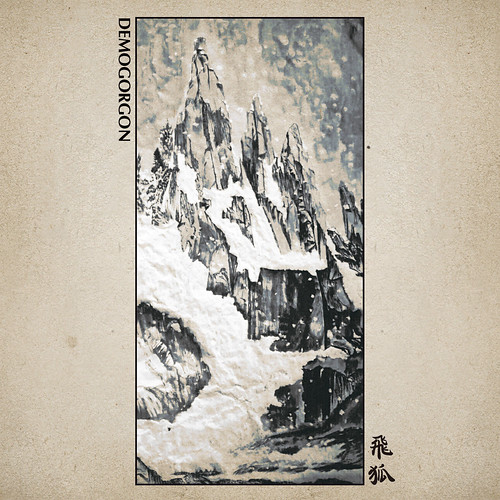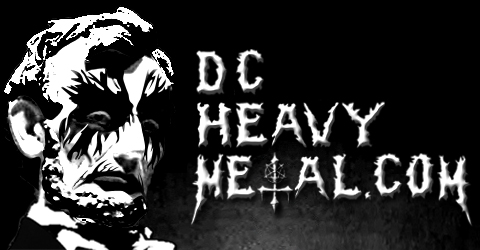Band: Demogorgon
Album: 飛狐 / Dilemma. Revenge. Snow.
Release Date: 31 October 2016
Record Label: Pest Productions
Buy on CD ($9.99) or digital ($5) from: Bandcamp

As 2016 comes to a close you’ve probably seen countless end of year lists of albums, often listing many of the same popular releases. We don’t like ranking music here at DCHM (our album reviews aren’t given a score for this reason as well) so at the end of the year I always give my album review writers the chance to pick an album of their choice from the year that they feel deserves more attention than it received. It doesn’t have to be a local band, and in fact this year they have both chosen bands from outside the US. First up is DCHM writer Tal’s in depth review of the debut release by a new black metal band in China. Be sure to stream the track at the end of the post to give it a listen while you read and stay tuned for our next end of year album review post coming up shortly.
I am once again enthralled by the literary theme of an atmospheric black metal band – this time Demogorgon, a project of members from established Chinese black metal bands Zuriaake (atmospheric black metal), HolyArrow (epic black metal) and Destruction of Redemption (primitive black metal) as well as the eponymous Demogorgon, a major figure in the Chinese metal scene as one of the founders of the magazines Extreme Music (《极端音乐》) and Dragonland Music (《金属乐界》).
These metal masterminds teamed up to produce a short debut based on the martial arts novel Flying Fox of Snowy Mountain (《雪山飞狐》) by one of the founding fathers of the modern martial arts novel, Jin Yong (金庸). I actually started reading Flying Fox, in Chinese, over the summer, but didn’t finish it yet. Still, the context of an exciting, bloody and yet romanticized story set in the world of wuxia (武侠, the martial hero) immediately caught my interest and made this musical work richer for me.
This release contains only two tracks, although it still clocks in at about 25 minutes total. The first song is called “飞狐” (“Flying Fox”) in Chinese and “Dilemma. Revenge. Snow.” in English — I figure this is because non-Chinese speakers may not know the significance of Flying Fox or be able to understand the lyrics, so the English title gives them an idea of the themes of the song. The song is 14 minutes long, in fine atmospheric black metal form. It has four distinct sections, which are so clearly separated that they might as well be individual songs.
The first section introduces the setting and the story with all the gradual buildup of a movie soundtrack. It starts with a few martial horns blaring and isolated drumbeats, and then distorted guitar notes like thickly falling snow with a dreamlike sad melody floating above. Then it launches into chugging atmospheric guitars, drumming with an irresistible marching rhythm and harsh screams. A duet of clean, solemn vocals poetically describe the desolate wintry landscape:
A cold night with few stars
Shadows vanish and voices retreat
Floating clouds sink away
The white moon is silent and bright
The frosted river, cold and lonely
The mountain forest stands desolate and solemn
Icy peaks like white cranes
The verse ends proclaiming the entrance of the hero: “Through the snow flies the fox!”
The second verse describes the lonely life of the wandering, vengeful martial hero in the same style:
Vengeance spanning generations
Half a lifetime spent wandering alone
Grass and trees flourish and decline
The swan geese fly away and return
A deserted village listens to the rain
I’m alone with my sorrow
The verse ends with an octave jump on the last word, followed by wordless singing in a higher, more emotional register – where before the vocals were solemn, now they give voice to the hero’s loneliness.
Around four and a half minutes, the second section begins, as the chugging guitars abruptly fade out and are replaced by synthesized reed and string instruments, whose long, clear and melancholy notes evoke vast snowy expanses. The harsh vocals that start a minute later sound like the howling of a blizzard. Distorted guitar notes blend discordantly with the vocals, adding to the impression of being lost in a storm.
This time the vocals are conveyed in a harsh, half-drowned scream, once again describing the solitary life of the martial hero:
A free spirit all my life
A wandering swordsman
Used to favor and vengeance
Drawn sword whistling through late autumn
This is followed by a Summoning-like bridge with distorted guitar arpeggios and a gentle keyboard that’s more counterpoint than melody. When the vocals start up again, the vocalist’s extended screams and the vistas of nature evoked by the music make the human feelings in the lyrics epic-sized:
Love and hate are so difficult to lay down
I dream of joy and sadness
And my tears fall in solitude
Just before the nine minute mark, the third section begins with ominous, brassy and discordant notes, like horns sounding before a battle, but in a gloomy key. A repeated clean guitar arpeggio adds to the sense of anticipation before the song plunges into an avalanche of distorted guitar backed by percussion like the clashing of swords and overlaid with harsh screams. The vocals are slightly different again, the screams higher and more desperate-sounding, and the driving, repetitive guitar arpeggio evokes a relentless onslaught of blows. Obviously, this section describes combat, specifically the hero’s prowess:
Blade like sudden thunder
Imposing as the mighty heavens
The vigor of my sword sweeps through the cold sky
The mountains shake with the tiger’s roar
My jade disc travels as a fierce dragon
Then, without relenting its musical onslaught or distraught vocals, the song reverts back to describing the hero’s loneliness and sorrow:
Cherishing
The icy heart of the orchid
Sighing
At the hurried moment of joy and love
Turning my head to look back
The lonely stars weep
A sad moon rises
Then, while the martial drumming, battering distorted guitar and even the harsh screams continue, the solemn duet from the beginning of the song returns for a final sorrowful verse, reprising lyrics from earlier:
The lonely stars weep
A sad moon rises
I dream of joy and sadness
And my tears fall in solitude
In the fourth section, the last 30 seconds of the song is filled with the mournful reed and strings from the start of the second section, as though snow blankets the landscape in the aftermath of battle, and the tragic story fades into memory.
The second track, “悲月 / Sadness Moon,” is very different in style, belonging to the genre of dungeon synth rather than atmospheric black metal. Dungeon synth is a genre of synthesized music that has a medieval feel. This particular track also has a somber, mournful feel at first, as befitting the title. It starts out dominated by long, low tones of synthesized pipe organ. Eventually, resounding drumbeats and a synthesized choir and strings join in, and then a synthesized reed instrument plays a dreamy but lonesome melody similar to the one that opened the album. The second half of the track has a grander and more martial feel, with a marching rhythm, but the final organ tones close the album on a solemn note.
The album purports to “vividly depict the vast lands of northern China” and to evoke the jianghu (江湖, the quasi-outlaw society of martial artists in ancient times). I think it succeeds in creating a certain impression of these concepts, anyway. Both the white-noisey sound of distorted guitar and the solemn or melancholy clean parts lend themselves well to describing desolate, snowy landscapes. This impression is heightened if you watch the lyric video for “Dilemma. Revenge. Snow.” where you can actually see the mountain scenery (in the form of a traditional Chinese painting) as the song unfolds. The jianghu described by Demogorgon, meanwhile, is a solitary existence full of loneliness, longing for lost love, obsession with vengeance, and epic-sized violence – ideas conveyed both by the lyrics and the sorrowful or martial sound of the music. These are not the only or the most important features of the jianghu of Chinese martial arts novels, however – loyalty and seeking after justice are a few others that come to mind – but they are the qualities conveyed by Demogorgon’s work.
That’s not to say I don’t like it, though. Sad atmospheric music is exactly the kind I enjoy, and if it has an epic story tied to it, so much the better. The harsh and distorted nature of atmospheric black metal means that non-metalhead fans of Chinese martial arts novels may not be able to get into the album, or the first track anyway, but by contrast, one does not need to be a fan or knowledgeable about Flying Fox or martial arts novels to enjoy the music as a metalhead. The brooding mood and solemn vocals remind me a bit of Caladan Brood, so fans of that sort of music would probably enjoy the first track, “Dilemma. Revenge. Snow.” The second track, “Sadness Moon,” is not as strong or memorable in my opinion, but then again I’m a bigger fan of atmospheric black metal than of dungeon synth. In any case, the first track is diverse and epic enough to be worth four songs, and a must-hear for 2016 in atmospheric black metal.
飛狐 / Dilemma. Revenge. Snow.:
1 Comment
Comments RSS TrackBack Identifier URI






mailloten
Review of 飞狐 / Dilemma. Revenge. Snow. by Demogorgon | DCHeavyMetal.com